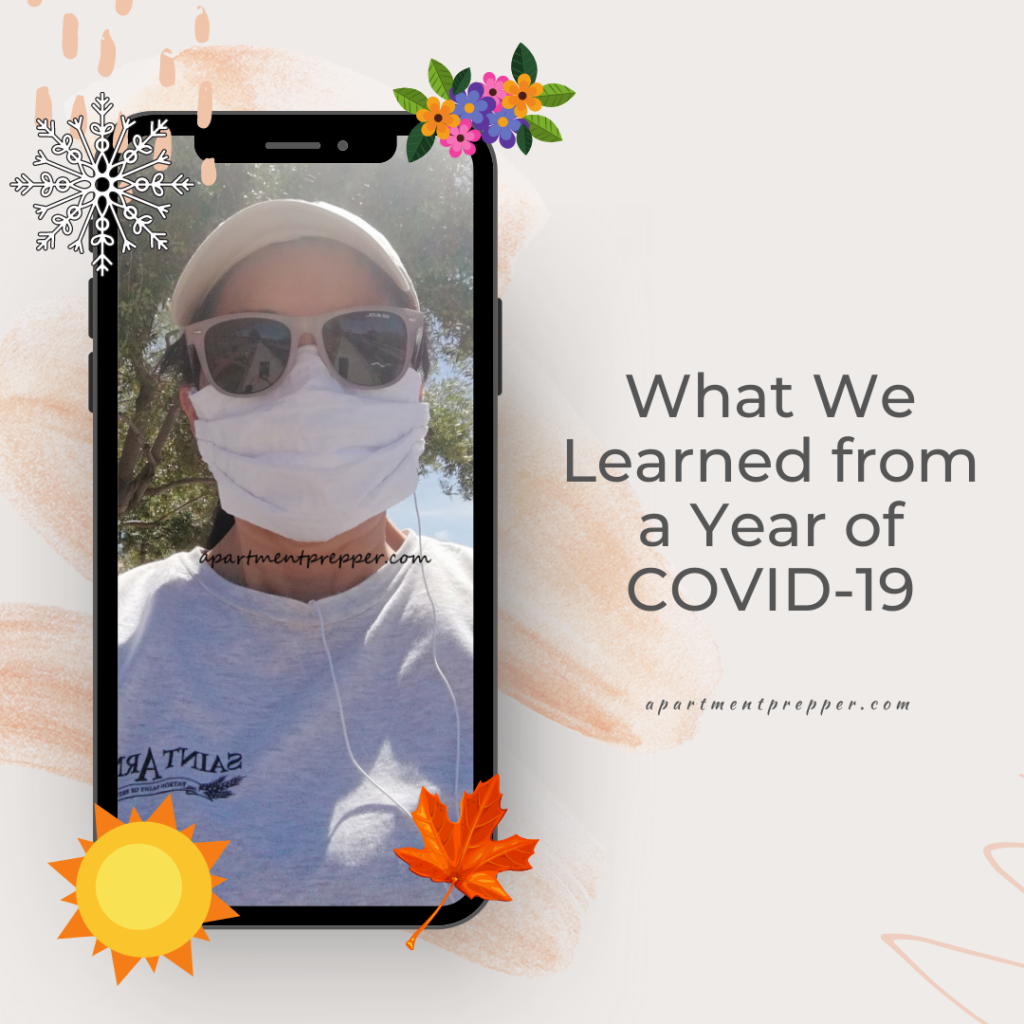Written by Bernie Carr
Back in January 21, 2020, I wrote about the little known “coronavirus” that emerged in Wuhan, China. I write about a lot of new developments but this particular one struck me as significant. I had a feeling it would be important to prepare just in case. But I had no idea it would change the entire world as we know it.
Sometime in mid to late March last year, the lockdowns started in the United States. Who would have thought that January-February 2020 would be the last few months of normalcy? That those couple of months would possibly the last time (indefinitely) many of us would be able to go to the gym, watch movies in the theater, go to church, eat at restaurants, walk around without a masks or social distancing, shake hands with people – things that we previously took for granted. Sadly, a great many people would become seriously ill and lose their life.
Just sharing a some thoughts on what I learned:
Trust your instincts
When news started coming in about the new coronavirus, I paid attention to everything I could find about it. It was a little difficult to separate fact from fiction, but instinctively, I knew things could take a turn for the worse and shared the information with everyone who would listen. I wished I could be wrong about it, but I was glad I prepared ahead of time.
The system is fragile
It did not take long for supply chain disruptions to occur due to COVID-19. Because people started panic buying toilet paper, paper towels, hand sanitizer, disinfecting sprays and wipes, shelves started emptying out. Next thing you know, other commodities followed: rice, flour, yeast, canned foods, pasta and other shelf-stable consumables also started getting scarce. As workers in meat processors became ill, a shortage of meats also occurred.
You don’t need a crystal ball to figure out what you should stock up on: buy foods that your family eats, and supplies that you need on a regular basis. Have at least a few weeks supply on hand to weather any short-term disruptions.
Stocking up vs. hoarding
In a disaster, items that you normally take for granted suddenly become very valuable. Fights were breaking out at stores over the last pack of toilet paper.
If you purchase a few items to add to your stockpile each time you shop – one or two canned foods, a few rolls of toilet paper, a couple of gallons of water – you will have a good supply to last you for a few weeks to a month.
You won’t need to hoard toilet paper when supplies seem to tighten because you already have a few weeks worth stashed away.
Help may not be available
Emergency rooms and hospitals became over-crowded during the height of cases, curtailing emergency room visits for minor emergencies. To ensure you are able to take care of minor health issues at home, having a well-stock first aid kit is a must.
Disasters can happen simultaneously
We were already in a pandemic while other disasters continued to happen. The year 2020 had an active hurricane season and just recently, unprecedented severe winter storms struck the South leaving thousands without power and water. Nature does not discriminate – getting hit with one disaster does not give you a pass that another one won’t come along at the same time or soon after. It just means that as soon as your supplies get depleted you need to replace them and get ready for the next.
What stored items worked and what didn’t
Three years ago I had a couple of dozen N-95 masks, but I elected to donate them right while downsizing before moving to another apartment. I only kept a handful. I found myself regretting that, but hindsight is 20/20 as they say. I ended up purchasing a box of disposable masks before they became scarce.
I was glad to have a month’s work of toilet paper that a picked up on a Costco run weeks before the lockdowns so I did not feel the need to run to the store when the panic buying started. I had also purchased hand sanitizer online.
I bought a couple of boxes of Saltine crackers that have now expired but are still sitting in the pantry. I think I will grind them up and uses as coating for fried chicken.
Fewer shopping trips
We previously shopped on weekly basis but that has changed. We only shop for groceries every two weeks. To accomplish this, I create a menu to cover meals for two weeks, take inventory of what I have at home and make a list. It has not been easy changing the weekly shopping habit, but so far we have been able to keep it up.
Being healthy is a prep
Having a number of health issues makes one susceptible to germs and health risks. One thing this pandemic has taught me is to eat a healthy diet, get adequate exercise and sleep and minimize stress.
Disasters can be divisive
Throughout the year there was much divisiveness about how to handle a pandemic, even between friends and family members. Some people did not take the pandemic seriously and continued to go out mask-less and not socially distanced, while some immediately adapted quickly and self-isolated. Some are waiting to get the vaccine while others may decide to wait a while. This creates rifts even within close families. People will jump to conclusions on how someone should or shouldn’t be handling the situation. You need to focus on your inner circle and what you can do to help them stay safe. A little understanding and respect go a long way.
Focus on what you can control
The dark days of the lockdown brought a lot of stress and anxiety about the future. It was hard to concentrate and get adequate sleep with your mind racing on all the bad things that can happen. I learned to calm down and focus on daily tasks to keep going. Be observant and stay aware of what’s going on, with the knowledge that you can only act upon things you can change. I realized I can’t control everything that happens, sometime all you can do is pray and leave it to God.
Gratitude
COVID-19 is still here and mutating. Thankfully, the number of cases are going down, but progress can reverse. All we can do is cope with the new normal.
While the world situation looked bleak, I realized I still had a lot to be grateful for. Focus on the day to day blessings – a roof over your head, family, friends, food on the table, blue skies, a beautiful sunset, your pet nudging you in the morning. If there is one thing I learned, it’s that every little thing cannot be taken for granted. Thanks for sticking around and reading my post. I appreciate you as well.
We are an affiliate of Amazon.com, which means we received a small commission if you click through one of our Amazon links when you shop, at totally no cost to you. This helps keep the lights on at the blog. Thanks!
About the author:
Bernie Carr is the founder of Apartment Prepper. She has written several books including the best-selling Prepper’s Pocket Guide, Jake and Miller’s Big Adventure, The Penny-Pinching Prepper and How to Prepare for Most Emergencies on a $50 a Month Budget. Her work appears in sites such as the Allstate Blog and Clark.com, as well as print magazines such as Backwoods Survival Guide and Prepper Survival Guide. She has been featured in national publications such as Fox Business and Popular Mechanics. Learn more about Bernie here.



It’s a flu and is not affected by a shot–a vaccine is a shot that protects from the illness–not the case here..so stay away from the shot.
Watch this:
https://www.infowars.com/posts/medical-doctor-exposes-10-deadly-dangers-of-pzifer-johnson-johnson-covid-19-vaccines/
*****they are injecting Mrna that has a recipe in it to build a protein to make an antibody against the protein that is supposed to keep us healthy and keep us from getting sick******
Why would the WH spend $1.5 BILLION to urge you to get the shot?? If it was so great and not killing people, you would want it, right???
RESIST–do not wear a mask– that is like stopping a mosquito using a chain link fence.
It is an engineered flu and no mask will help.